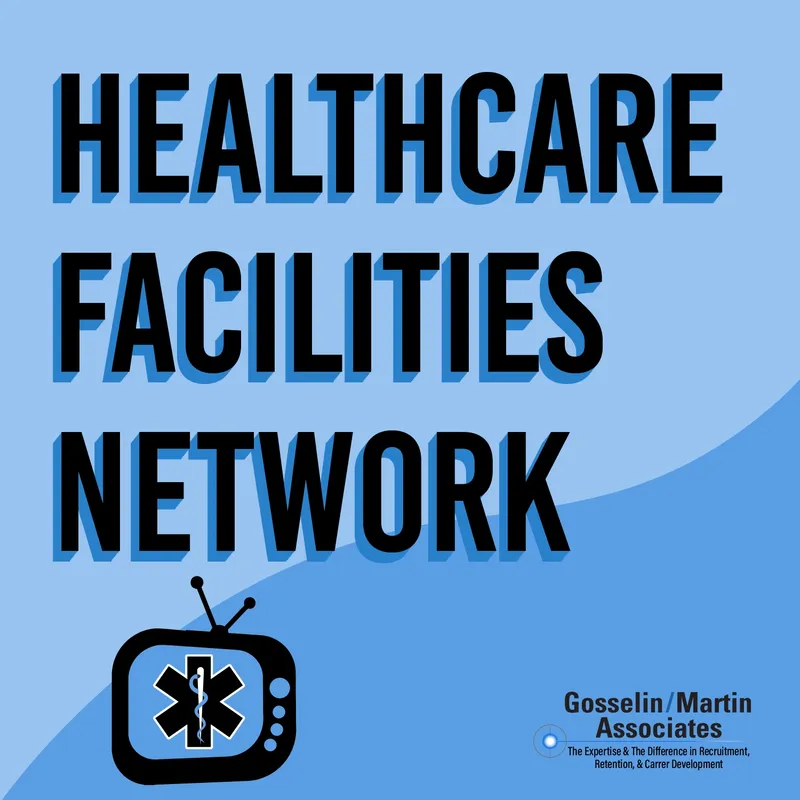For more than 17 years Gosselin/Martin Associates has assisted healthcare organizations across the United States in finding and hiring top talent in hospital engineering.
As healthcare professionals and experts with experience in recruiting, succession planning, and education, we even created our own YouTube channel. The mission of HFN is simple: Increase the visibility of the facilities management role by any means necessary, informing, educating, and boosting awareness that this rewarding career is open and available to all. Healthcare Facilities Network
“We were seeking a high-level executive leader who could develop strategies for our newly configured regional hospital system. Lots of changes and plenty of challenges beyond the traditional hospital engineering operations position. Gosselin/Martin Associates was diligent in their search for an individual who not only provided this vision but aligned well with our established culture and corporate philosophy.“
-Bimal Patel, Regional VP of Operations, Hartford Hospital Healthcare, Hartford, CT
What is behind the discipline of hospital engineering?
Some of the world’s most complex and sophisticated electrical and mechanical equipment is found in hospitals.
Something people don’t always think about when they consider the complex systems utilized in hospitals is the staff who keep that equipment functioning appropriately: That is, hospital engineering. They ensure that all who enter the hospital have the safest experience possible. Safety includes properly functioning mechanical and electrical systems and equipment. Without it, patients cannot be treated.
Hospital engineering staff are integral to the healing mission of the hospital.
What equipment does a hospital engineer work on?
Hospital Engineers work on a lot of medical devices such as:
- Boilers
- Air-conditioning equipment
- Air handlers
- Diesel engines, turbines
- Pumps, condensers
- Generators, switchgear, automatic transfer switches
- Compressors
- Underground storage tanks, water tanks, pipes
Hospital engineering staff start up, regulate, shut down, and repair equipment. They manually operate equipment, adjust, and check safety devices when needed. It is their responsibility to ensure that all these systems are running correctly, efficiently, and safely.
“Gosselin/Martin Associates provided credible recommendations, derived from extensive interviews with stakeholders, and an in-depth review of operational needs. They provided a comprehensive roadmap for the organization to consider as our system grows.”
-Karen Dethloff, VP, Facilities Management, MetroHealth System, Cleveland, OH
What type of routine maintenance might a healthcare engineer perform?
- Replace filters
- Lubricate internal motors, belts, parts
- Check the air quality of ventilation systems
- Minor welding, plumbing, and electrical repairs
- Carpentry repairs to walls, roofs, windows, or ceilings
What are the duties of a healthcare engineer?
- Healthcare professionals manage, preventative, and perform routine maintenance programs for hospital engineering.
- Healthcare professionals work on equipment and building systems according to diagrams, sketches, manuals, and manufacturer’s specifications.
- Responsible for electrical and mechanical equipment.
- Review and complete work requests for repairs and maintenance
- Provide operations and maintenance knowledge on all building systems such as generators, transfer switches, electrical distribution, steam, chilled water, domestic hot and cold water, sanitary drains, storm drains, medical gases, fire protection, and temperature control.
- As needed participate in design and construction projects.
- Maintain all procedures and systems to meet regulatory compliance.
Hospital Engineering Employment FAQ

What are the different types of healthcare engineering roles?
There is demand in healthcare so there are many types of healthcare engineering roles in a hospital, including maintenance engineers, facilities generalists, chief engineers, structural engineers, mechanical and electrical engineers, stationary engineers, boiler operators, fire engineers, and biomedical engineers.
However, it is also important to note that there is not always a consistent terminology from hospital to hospital regarding roles and responsibilities under the title of Engineering. Therefore, there can appear to be multiple engineering roles across healthcare related to engineering, and there are.
For example, some hospitals will call the facilities management role Director of Engineering, while others will call the same role Director of Facility Management or Director of Plant Operations. So, when reviewing hospital engineering roles, it is essential to understand what they seek, which is not always known through the job title.
“To upgrade this critical role during our leadership transition, Gosselin/Martin Associates brought a deep understanding of the attributes needed to be successful in this job in today’s healthcare environment. This knowledge was particularly helpful in developing the profile for the new facilities director.“
-LouAnn Scheelhaase, HR Business Partner, Carle Foundation Hospital, Urbana, IL
What do engineers do in healthcare?
Hospital engineering staff and services are responsible for maintaining hospitals’ extensive heating, air-conditioning, refrigeration, and ventilation systems. Hospital buildings are among the most complex structures that exist. Engineers must be skilled in designing and operating them.
The essential function of the Hospital Maintenance Engineer (or Facility or Plant Engineer, as it may be called) is to provide all engineering support for the design, construction, operations, and maintenance of equipment in hospitals and offsite properties. They ensure that the physical environment, that is the building and its equipment, are maintained and operated safely, according to its specifications.
Hospital engineers perform preventive maintenance on all equipment on a regularly scheduled basis.
Do hospital engineers work alone or as a team?
In the hospital engineering role, you could work independently on equipment or as part of a more extensive crew to maintain equipment. Whether you work alone or with others, the employees in a facility engineering department function as a team.
Healthcare engineering careers call for employees to be able to work off hours and on shifts that include holidays, nights, and weekends. Because a hospital never closes, there must always be maintenance workers present in the hospital, or on call who can respond promptly. When emergency maintenance is needed, often in an unscheduled manner, hospital engineers, one or all, respond.
Some larger hospitals have hospital engineers working on three different shifts:
- 7 am – 3 pm
- 3 pm – 11 pm
- 11 pm – 7 am
What type of training is required in the hospital engineering role?
Training to provide hospital engineering services is generally acquired through college, on-the-job training, as an apprentice (such as in a Union), or vocational schools.
Apprenticeship can last for several years and will include on-the-job and classroom training. As healthcare systems engineering equipment becomes more complex, more training and education is required, on an ongoing and continuing basis. The requirements of this job are not static
“Thank you for the knowledge you shared at the program. I picked up information that I will be able to use back on the job that will make me a more effective manager.”
-Mary Lynn Hayes, CHFM, Manager, Facility Services, Allied Services, Integrated Health System, Scranton, PA
What are some examples of specific engineers who might work in a hospital?
Hospitals employ a multitude of engineers. But, outside the maintenance engineer, not all engineers who work in a hospital are employed as direct hospital engineering staff.
* Mechanical, electrical, and structural engineers are not jobs found on hospital engineering staff. These specialized services are typically acquired via third parties on an as-needed basis, such as during construction or the design of mechanical or electrical equipment. There is a continuous demand for the latest technology and equipment and the expertise of these engineers is critical to healthcare.
- Healthcare facilities have robust fire protection engineering and design systems. Fire safety design presents unique challenges and accordingly, fire safety engineers play an important role in hospital design, construction, and operation. Fire engineering services are typically procured through a consulting organization and not found on a hospital staff.
- The Chief Engineer role is typically found as a direct hospital employee. They have responsibility for maintenance and repair, utility plant operations, energy management and sustainability, safety, fire prevention, and emergency preparedness.
- Biomedical technicians/engineers maintain, calibrate, adjust, and repair many different types of hospital equipment. They work on medical imaging equipment like X-rays, electric wheelchairs, defibrillators, and patient monitors, using software and tools to repair sophisticated medical equipment. Biomedical Engineering is specialized in nature and includes instrumentation design.
Biomedical engineers are typically direct employees of a hospital, but they do not work for or in the Engineering Department. They are often their own, distinct departments.
What is the meaning of hospital engineering?
Healthcare facilities serve patients and their families at critical moments, often when they are at some of the most vulnerable times of their lives. The hospital environment is designed to create a nurturing environment for everyone, from patients and their families to clinical and supporting staff. Hospital engineers support and enable this mission.
There is an intense and time-consuming learning curve in hospital engineering. Healthcare systems engineers (Mechanical, Electrical, and Plumbing) design and utilize some of the most complex engineering systems in the world. In addition to the building systems required for day-to-day operation, such as heating, cooling, ventilation, and air conditioning, they design water and drainage, lighting, medical gas distribution, positive and negative pressure rooms, and proper humidity levels based on room function.
The hospital engineer supports all of this work in the hospital.
Do healthcare engineers design operating rooms?
Yes. Operating Rooms are some of the most complex, mechanically precise rooms in existence. While an architect will design the space, engineers will design the indoor requirements of the operating room, taking into account elements such as humidity, temperature, and air exchanges. Regulators will close operating rooms if they do not comply with the code: Good engineering is a must.
Patient safety, air quality, and ambient comfort are guiding principles in decisions made by engineers in operating rooms.
Are there hospital engineers who focus on sustainable initiatives?
Increasingly, healthcare systems are hiring sustainable engineering staff who focus on environmentally sustainable designs and practices. The overall goal is to improve building performance and the efficiency of operating systems. Two examples of sustainable engineering staff:
Building Automation Services (BAS) Engineers can be employed by larger hospitals with complex buildings.
A Building Automation System (BAS) is a system of hardware and software, connecting heating, ventilation, and air conditioning systems (HVAC), lighting, security, and other systems to communicate on a single platform. BAS systems deliver building information relative to the operational performance of a building and enhance the safety and comfort of a building while, over time, presenting cost and energy-saving opportunities.
Sustainability Engineers create structures and processes that are environmentally responsible and resource-efficient throughout the life cycle of a building, from selecting the site for the building to design, construction, operation, maintenance, and renovation.
Is there a demand for healthcare engineers?
The demand for healthcare engineers is strong across the United States. Whether the role title is healthcare engineer or maintenance engineer, there is a need for people to work in these open hospital engineering roles.
Indeed, hospital engineering staff, especially in maintenance and the trades, is problematic: There simply are not enough people to fill the open positions and just about every hospital in the country seeks these employees. If the hospital or healthcare system is located in a rural area, roles can be even more difficult to fill.
Open and unfilled hospital engineering roles in management and the trades look to be plentiful over the coming years. The lack of available people across hospital engineering is at the root of Gosselin/Martin Associate’s creation of the Healthcare Facilities Network. People are needed in hospital engineering.
Can Gosselin/Martin Associates and the Healthcare Facilities Network assist in finding hospital engineering talent?
Yes, as we have done for more than 17 years for hospitals across the United States.
